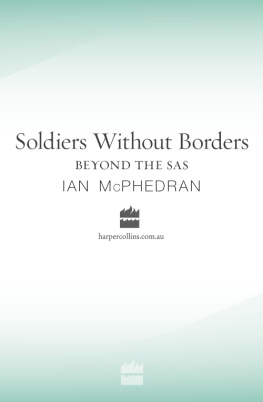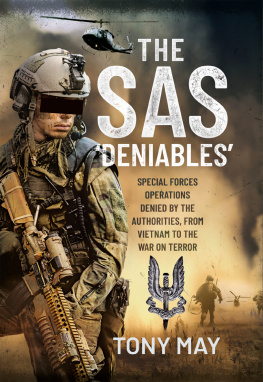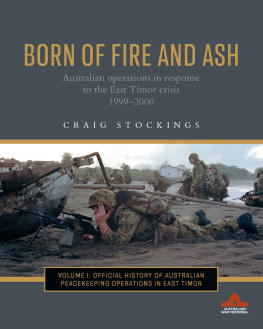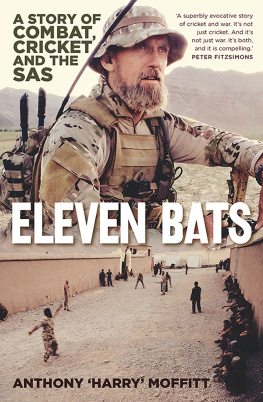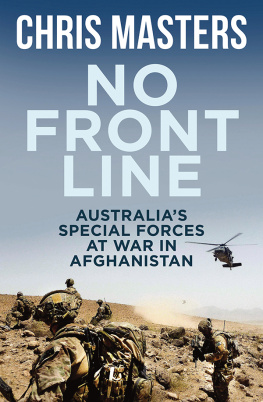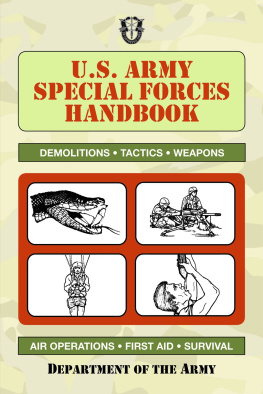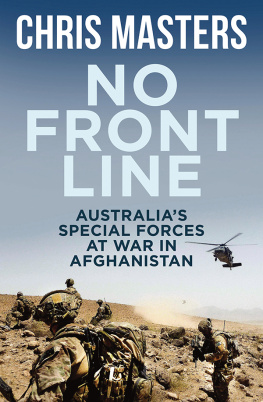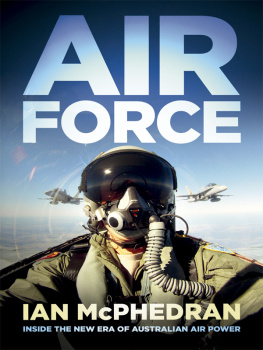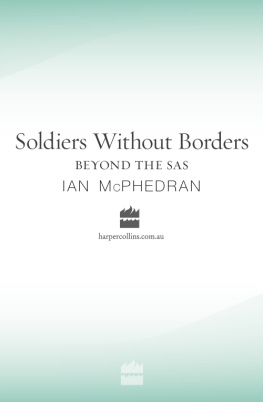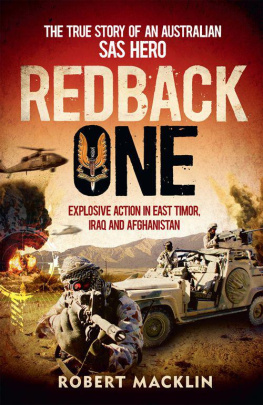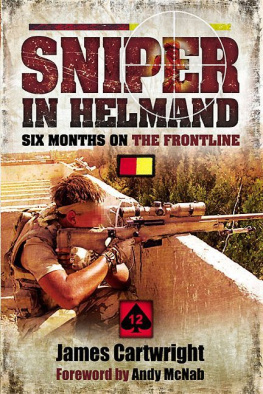For Verona and Lucy
| 1 SAS | 1 SAS Squadron |
| 2IC | second in command |
| 2RAR | 2nd Battalion Royal Australian Regiment |
| 2 SAS | 2 SAS Squadron |
| 3RAR | 3rd Battalion Royal Australian Regiment |
| 3 SAS | 3 SAS Squadron |
| ADF | Australian Defence Force |
| ADFA | Australian Defence Force Academy |
| AO | area of operation |
| ASIS | Australian Secret Intelligence Service |
| CCP | casualty clearing post |
| CDF | Chief of the Defence Force |
| CQB | close-quarters battle |
| CO | commanding officer |
| CT | counterterrorism |
| DFAT | Department of Foreign Affairs and Trade |
| DIO | Defence Intelligence Organisation |
| DRC | Democratic Republic of Congo |
| dust-off | troop extraction |
| Falintil | Army for the National Liberation of East Timor |
| FOB | forward operating base |
| GPS | global positioning system |
| HALO | high altitude low open |
| helo | helicopter |
| Huey | Iroquois UH1H helicopter |
| Kopassus | Indonesian special forces |
| LNG | liquefied natural gas |
| LRPV | long-range patrol vehicles |
| LUP | lying up position |
| MID | mentioned in dispatches |
| NCO | non-commissioned officer |
| NVG | night-vision gear |
| OAG | offshore assault group |
| O-boats | Oberon Class submarines |
| OP | observation post |
| PTS | Parachute Training School |
| PTSD | post-traumatic stress disorder |
| RAAF | Royal Australian Air Force |
| RHIB | rigid hull inflatable boat |
| RMC | Royal Military College, Duntroon |
| RPG | rocket-propelled grenade |
| RSM | regimental sergeant major |
| SASR | Special Air Service Regiment |
| SBS | Special Boat Service (UK) |
| SEALs | Sea, Air and Land Forces (US Navy) |
| SF | special forces |
| SOC | Special Operations Command |
| SOCOM | Special Operations Command |
| SOE | Special Operations Executive |
| SOPs | standard operating procedures |
| spook | secret agent |
| TAG | tactical assault group |
| TTPs | tactics, techniques and procedures |
| UAE | United Arab Emirates |
| UN | United Nations |
| UNAMET | United Nations Assistance Mission in East Timor |
| UNAMIR | United Nations Assistance Mission for Rwanda |
| USAF | US Air Force |
| WMDs | weapons of mass destruction |
One of the biggest challenges facing the Special Air Service in the uncertain post 9/11 world has been to hold on to its highly trained soldiers.
This extraordinary group of Australians work in a shadowy but tremendously rewarding occupation and taxpayers invest a huge amount of money in their special skills.
In my first book, The Amazing SAS, many men of the SAS opened up about their exploits from the time of the 1999 East Timor crisis to the 2003 Iraq War. Their personal tales and insights, which they shared with generosity of spirit, were about extreme soldiering and how to apply strategic force while maintaining humility and humour.
Yet since 2003 many of them have resigned to pursue other opportunities in a borderless marketplace where their skills are in high demand.
Ever since World War II there has been a trickle of special forces operatives who have moved out to pursue other interests but that trickle has become a torrent in the early years of the twenty-first century.
In Iraq alone there are more than 40,000 private security contractors and the best paid of those are former tier one special forces operators from Australia, Britain and the US. Hundreds more are working in Afghanistan, Africa, and South-east Asia and in many other parts of the world applying their unique abilities to a variety of highly paid jobs.
I wanted to know more about what our former elite soldiers were doing in these often obscure pockets of the world and how they were finding life beyond the SAS, so I raised the idea of this book with Terry OFarrell.
Terry left the SAS himself in 2004 after a 38-year army career mostly spent in the regiment, including two tours of duty in the Vietnam War. He is now a full colonel and assistant commander of special operations for the government of the United Arab Emirates.
He liked the idea for a new book and he offered some unique perspectives. The Middle East is the current centre of the action for serving and former special forces soldiers and Terry and his team are right at the heart of it.
One of them was George, a senior operator whom we met in The Amazing SAS during his time in East Timor and Afghanistan and a ferocious networker.
Soon emails were flying around the world and my initial list of names jotted on the back of an envelope grew into a long catalogue of those who were prepared to share their stories, including some upon whom fortune has not smiled as kindly as she has on heroes of the most recent conflicts.
A strong theme quickly emerged. Wherever they are and whatever they do, these former SAS soldiers are linked by a bond that is forged during their time in the elite regiment.
The new information age has also enabled them to keep in touch as never before, contributing to the creation of a shadowy and increasingly valuable global network of former brothers-inarms that reaches across generations and national borders.
It is a network that is made all the stronger by their common experience of the gruelling SAS selection course, which requires each successful candidate to leave his old self behind and step forward into a new life.
So as I set out in late 2006 to discover more about what ex-SAS men get up to after they walk out the gate of Campbell Barracks in Perth, I was very lucky to meet up again with some of the great characters whom I encountered as I researched the first book.
They were very generous with their time and hospitality as well as opening doors into the wider network. Whether it was in a small hamlet outside Hobart or amongst the concrete, steel and glass fantasy of Dubai or in a London pub, I found an incredible and ever-expanding network of these former troops linked together across the globe and all of them with terrific stories to tell.
That is how the theme of Soldiers Without Borders emerged. As one former SAS man told me, it doesnt matter where he is or what he is doing; a quick call on Skype will connect him to dozens of mates. In some places, such as Dubai international airport, they can literally collide with one another in the check-in queue.
The Chief of the Australian Defence Force, Air Chief Marshal Angus Houston, is more aware than most of how difficult it is to keep special forces soldiers stimulated and in the service of the Commonwealth.
I hold them in the very highest regard, he told me in March, 2008. I think they are arguably the best special forces in the world. They are certainly the crme de la crme as far as were concerned and they do a magnificent job for us. And therefore I am very keen to retain as many of them as I can.
Next page
